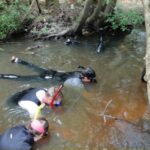The central focus of GA-FIT is the development of a Habitat Conservation Plan (HCP). Under the federal Endangered Species Act, five species of freshwater mussels are listed as endangered or threated in the Lower Flint River Basin, and one additional species is in the process of being listed as endangered. The Act prohibits the "taking" of any individuals of those species -- that is, they cannot be harassed, harmed, hunted, injured, killed, trapped, collected, or captured without a permit. By developing an HCP that will provide protections for the listed species, GA-FIT will support application for an Incidental Take Permit from the federal government that will provide assurances over how that Act will be applied.
An HCP is a plan that accommodates economic activity to the extent possible by authorizing the limited and unintentional take of species protected by the federal Endangered Species Act, when that taking occurs incidental to otherwise lawful activities. Without an HCP, farmers in the Lower Flint River Basin face uncertainty over how enforcement of the Endangered Species Act might affect their future access to water.
The State of Georgia, with support from its GA-FIT partners including the Georgia Water Planning and Policy Center at Albany State University, plans to develop a Habitat Conservation Plan and apply for an Incidental Take Permit for agricultural water use in the lower Flint River Basin. The Georgia Environmental Protection Division describes the State's vision for the HCP here. An HCP for this region is not a new idea. Many people in the region and in state and federal agencies have been discussing and preparing for an HCP for many years. An HCP for this region builds on decades of planning, research, data collection, and policy that have been implemented in the Lower Flint River Basin. The investments of farmers and the state in water meters, water resource models, pilot projects, and stakeholder-led regional water planning have helped to lead us to an HCP as a next step in improving water resource management in the region.
Currently, the state prohibits new and expanded withdrawals from surface waters and the Floridan Aquifer in the Lower Flint River Basin, and the moratorium on new uses has created an concern over the future economy of the region. An HCP will not only provide assurances about future water resource managment, but it will also enable a comprehensive approach that will support targeted and tailored management based on geographic, climatic, and hydrologic conditions and seek to meet all water needs in the region. Making the HCP a reality will require the input and support of farmers and many others. Its success may depend on policy change at the state level, and if so, legislators and agency leaders will play an important role in facilitating and guiding its implementation. An HCP is a shared vision for the Lower Flint River Basin, and therefore, GA-FIT seeks to engage a broad range of stakeholders and policy leaders in its development through the Project Advisory Committee. By working together, we can attain our shared goals for a vibrant economy and healthy ecosystems that support a high quality of life in the region.
An HCP will guide water resource management to meet all water needs -- economic and ecological -- in the Lower Flint River Basin.
Want more info?
Get in touch
Phone: (229) 430-2900






